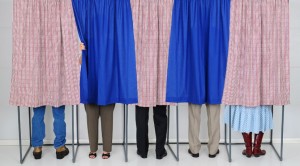Bringing Visibility to Nonreligious Voters

On the opening day of the Democratic National Convention (DNC), the Secular Coalition for America (SCA) hosted a Secular Democrat Reception for nonreligious delegates and attendees. The July 25 reception was an opportunity for nonreligious Democrats to learn about ways they can advocate for church/state separation, science-based policy, and nontheist visibility in their local Democratic parties.
The reception was held only a few days after emails leaked that suggested DNC Chief Financial Officer Brad Marshall had conspired to frame Senator Bernie Sanders (D-VT) as an atheist during the Democratic primary in hopes that it would damage his campaign in West Virginia and Kentucky. Issues of fairness aside, the emails serve as an unfortunate reminder that despite more than a quarter of all Democrats having no religious affiliation, the nonreligious are still fighting to feel welcome in the Democratic Party.
At the SCA reception, nonreligious Democrats from across the country discussed why the fight for inclusion was so important. Julie Fahey, a delegate from Oregon and an openly secular candidate for the Oregon state House, spoke about the importance of creating a space for nonreligious people in politics. Many other attendees shared stories about feeling underrepresented, even in their local Democratic parties in which they themselves are active. What brought all of the attendees together was a commitment to creating a culture in the Democratic Party that celebrates our shared secular values. It was an inspiring sight, and it was not the first time we’d seen it.
Only one month earlier, the Secular Coalition for America hosted the first-ever Secular Caucus at the Texas Democratic Convention. The caucus room was packed to standing-room-only capacity with attendees eager to learn about nonreligious voters, who are now the largest religious demographic within the Democratic Party. The day after the caucus, three policy resolutions submitted by the Secular Coalition for Texas were officially incorporated into the Texas Democratic Party platform.
At both the Secular Caucus in Texas and the Secular Democrat Reception in Philadelphia, there was a hunger for the work we’re doing. Countless attendees expressed enthusiasm for our mission and a desire to see the Democratic Party combat religious privilege with the same ferocity that the religious right has fought to impose it. But we also heard stories from lawmakers and political candidates who confessed to us that although they were nontheists, they could not be open about it for fear that it would cost them their elections. These testimonies and the recent DNC email leaks highlight a deeper problem in American political culture that goes beyond any one party.
Despite being the fastest-growing religious demographic the nonreligious are still underrepresented in our political discourse. This lack of visibility has real consequences. It feeds into the narrative that someone must be religious to be elected to public office. Until we have openly secular lawmakers and candidates, we will continue to have a de facto religious test for public office. Lack of visibility also causes nonreligious voters to be excluded from discussions of public policy that directly impact them. To increase the number of openly secular candidates and to get politicians to actively court nonreligious voters, we must speak up with a united voice.
This is why the SCA is calling on activists in every state to work towards organizing secular caucuses, not only in the Democratic Party but in the Libertarian, Green, and Republican parties as well. Though secular voters are not politically homogenous, the issues on which we do align, such as separating religion and government and basing policy on reason and science, are fundamentally nonpartisan.
We are more than halfway through 2016, and it has already been a historic year for the nonreligious. The Reason Rally assembled thousands on the National Mall, the Secular Coalition led hundreds to Capitol Hill, and our work in Texas and Philadelphia brought unprecedented recognition to secular Democrats. The nonreligious have the potential to become a tectonic force in politics, but only if ordinary secular Americans stand up and take action.
